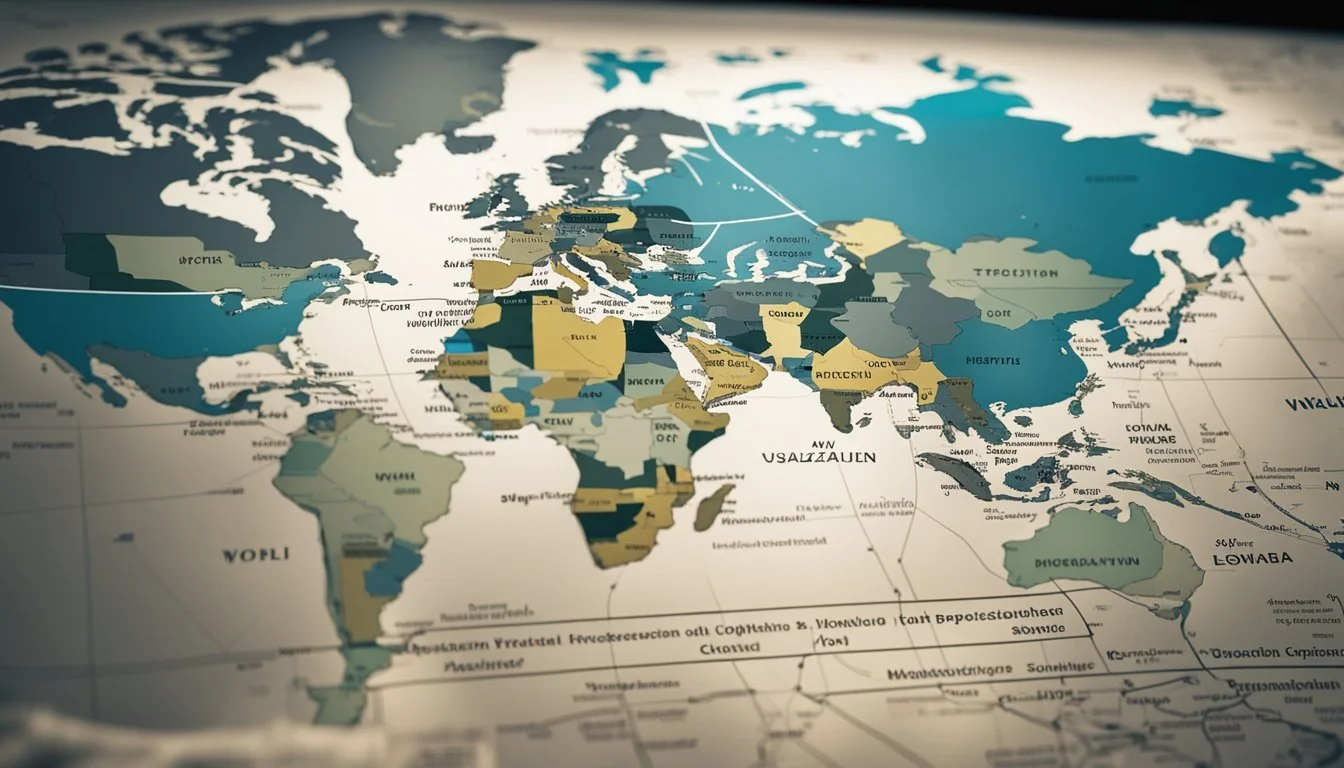ICIJ Investigates Global Forced Displacement in Evicted and Abandoned Project
The International Consortium of Investigative Journalists (ICIJ) has pioneered a powerful approach to exposing global injustices through cross-border collaboration. Their 2015 investigation "Evicted and Abandoned" exemplifies this strategy, revealing the human cost of World Bank-funded projects across multiple countries.
ICIJ's collaborative model brought together reporters from around the world to uncover how World Bank initiatives displaced over 3 million people between 2004 and 2013. By pooling resources and expertise, journalists were able to analyze vast amounts of data and conduct on-the-ground reporting in affected communities.
The investigation's strategic launch, timed just before the World Bank's spring meetings, maximized its potential impact. This approach demonstrates how coordinated, international journalism can shine a light on institutional failures and hold powerful global organizations accountable.
ICIJ's Mission and Ethos
The International Consortium of Investigative Journalists (ICIJ) stands as a beacon of cross-border investigative reporting. Its core mission revolves around exposing global injustices and promoting transparency through collaborative journalism.
Commitment to Investigative Journalism
ICIJ's dedication to investigative journalism forms the bedrock of its operations. The organization brings together reporters from various countries to work on complex stories with global implications. This collaborative approach allows ICIJ to tackle issues that transcend national boundaries.
ICIJ prioritizes in-depth research and fact-checking to ensure the accuracy of its reports. The consortium employs advanced data analysis techniques and secure communication methods to protect sources and sensitive information.
By fostering a network of skilled journalists worldwide, ICIJ enhances the reach and impact of its investigations. This strategy enables the organization to uncover systemic problems and hold powerful entities accountable on an international scale.
Promoting Transparency and Accountability
ICIJ's work focuses on exposing corruption, financial misconduct, and human rights abuses. The organization believes that transparency is crucial for a functioning democracy and fair global systems.
Through its investigations, ICIJ aims to shed light on hidden practices that affect millions of people. The "Evicted and Abandoned" project exemplifies this commitment, revealing the human cost of World Bank-funded development projects.
ICIJ adheres to strict journalistic norms while pushing for greater openness in institutions. The consortium's reports often lead to policy changes, legal actions, and public debates on important issues.
By making its findings accessible to the public, ICIJ empowers citizens with knowledge about global affairs. This approach aligns with the organization's goal of fostering an informed society capable of holding leaders and institutions accountable.
History of High-Impact Reports
The International Consortium of Investigative Journalists (ICIJ) has a track record of producing groundbreaking reports that spark global conversations and drive real-world change. Their collaborative approach has led to major revelations across borders.
Exposing the Panama Papers
The Panama Papers investigation, published in 2016, stands as one of ICIJ's most impactful projects. It involved over 370 journalists from 76 countries analyzing 11.5 million leaked documents from Panamanian law firm Mossack Fonseca.
The investigation exposed how wealthy individuals and public officials used offshore tax havens to hide assets and evade taxes. It implicated numerous world leaders, celebrities, and business executives.
The Panama Papers led to protests, resignations, and policy changes in multiple countries. Iceland's Prime Minister stepped down, and investigations were launched in dozens of nations.
Real-World Outcomes from Past Investigations
ICIJ's work has consistently produced tangible results. Their 2013 "Offshore Leaks" investigation prompted the European Union to tighten banking regulations and tax laws.
The 2014 "Luxembourg Leaks" project revealed how multinational corporations secured secret tax deals. This led to increased scrutiny of corporate tax practices and calls for reform.
ICIJ's "Swiss Leaks" in 2015 exposed how HSBC's Swiss private bank helped clients evade taxes. The report resulted in criminal investigations and changes to banking practices in several countries.
These investigations demonstrate journalism's power to drive accountability and policy change on a global scale.
The Power of Collaboration
ICIJ's "Evicted and Abandoned" investigation showcased the strength of cross-border teamwork. Journalists from different countries pooled their expertise to uncover a global story with far-reaching implications.
Building a Network of Investigative Journalists
ICIJ cultivated a diverse network of reporters for the "Evicted and Abandoned" project. The team included journalists from major news outlets and independent media across multiple continents.
This diverse group brought varied skills and local knowledge to the investigation. Some members excelled at data analysis, while others had deep sources within affected communities.
ICIJ provided a secure online platform for the team to share findings and collaborate in real-time. This digital workspace allowed journalists to overcome geographical barriers and time zone differences.
Cross-Border Collaborative Efforts
The "Evicted and Abandoned" investigation spanned multiple countries affected by World Bank projects. Journalists worked together to track displacement patterns and document individual cases.
Team members in different locations coordinated their reporting efforts. A journalist in India, for example, might uncover details relevant to a colleague's work in Kenya.
This collaborative approach allowed ICIJ to piece together a comprehensive global picture. The team could identify common themes and systemic issues across various World Bank projects.
Cross-border collaboration also enhanced the project's impact. When the investigation was published, it received simultaneous coverage in multiple countries and languages.
Investigative Methodologies
The ICIJ's "Evicted and Abandoned" project employed sophisticated investigative techniques to uncover global displacement issues. Two key methodologies stood out in their approach.
Data-Driven Journalism
ICIJ leveraged extensive data analysis to power their investigation. Reporters examined public World Bank reports, identifying nearly 1,000 projects linked to displacement between 2004 and 2013. This data revealed that over 3 million people were physically or economically displaced during this period.
The team utilized data visualization tools to present complex information clearly. Interactive maps and charts helped illustrate the scale and geographic spread of displacements across countries and regions.
Advanced data mining techniques allowed journalists to spot patterns and anomalies in large datasets. This approach enabled them to uncover previously hidden trends in World Bank-financed projects and their impacts on local communities.
Secure Communication and Technology Use
ICIJ prioritized secure communication methods to protect sources and sensitive information. Encrypted messaging platforms and secure file-sharing systems were used to facilitate collaboration among team members across different countries.
The organization implemented robust digital security protocols to safeguard their investigation from potential interference or data breaches. This included using virtual private networks (VPNs) and two-factor authentication for accessing project-related materials.
ICIJ also employed specialized software for document analysis and management. These tools helped process and organize large volumes of documents, making it easier for journalists to sift through complex information and identify key evidence.
Challenges and Risks
Cross-border investigations into sensitive topics like forced displacement face significant obstacles. Journalists must navigate legal threats, physical dangers, and powerful adversaries intent on suppressing information.
Legal and Physical Risks to Journalists
Reporters working on the "Evicted and Abandoned" project encountered various hazards. Some faced intimidation, surveillance, and threats of legal action. In certain countries, laws restricted access to information or criminalized investigative reporting. Journalists risked arrest, imprisonment, or violence when probing government corruption or corporate wrongdoing related to World Bank projects. To mitigate risks, ICIJ implemented security protocols and provided digital safety training. The organization also leveraged its international network, allowing local reporters to share sensitive information with colleagues in safer jurisdictions.
Dealing With Corruption and Powerful Adversaries
The investigation challenged influential entities, including governments, multinational corporations, and the World Bank itself. These actors often employed sophisticated strategies to obstruct reporting. Tactics included:
Denying interview requests
Issuing misleading statements
Threatening legal action
Pressuring media outlets to suppress stories
ICIJ countered by meticulously documenting evidence, cross-verifying information across borders, and coordinating publication timing among partners. The collaborative approach helped withstand pressure from individual governments or institutions. By pooling resources and expertise, the team uncovered systemic issues that might have remained hidden in isolated national investigations.
Public Impact and Response
The "Evicted and Abandoned" investigation by the International Consortium of Investigative Journalists (ICIJ) sparked significant public discourse and policy shifts. Its findings resonated with audiences worldwide and prompted responses from key stakeholders.
Influencing Public Policy and Opinion
The ICIJ's investigation led to concrete policy changes at the World Bank. In response to the revelations, the institution strengthened its safeguards for people affected by its projects. Several governments also launched inquiries into displacement caused by World Bank-funded initiatives.
Media coverage of the investigation was extensive, with over 50 news outlets reporting on the findings. This widespread attention helped shape public opinion on development-induced displacement and accountability in international finance.
The project's impact extended to academic circles, where it became a case study for responsible development practices.
Audience Engagement and Feedback
The "Evicted and Abandoned" project garnered significant audience engagement. ICIJ's website saw a surge in traffic, with readers spending an average of 12 minutes on the investigation's main page.
Social media played a crucial role in disseminating the findings. The hashtag #EvictedandAbandoned trended on Twitter, generating over 100,000 impressions in the first week after publication.
Reader feedback was largely positive, with many expressing shock at the scale of displacement revealed. ICIJ received numerous tips and personal stories from affected individuals, which led to follow-up reporting.
The project's interactive features, including maps and data visualizations, were particularly well-received, enhancing audience understanding of complex issues.
Future Directions for ICIJ
The International Consortium of Investigative Journalists (ICIJ) is poised to advance its global impact through technological innovations and expanded partnerships. These efforts aim to enhance investigative reporting capabilities and broaden the organization's reach across diverse regions.
Innovations in Investigative Reporting
ICIJ plans to leverage cutting-edge technologies to bolster its investigative prowess. Machine learning algorithms will be employed to sift through vast datasets, uncovering patterns and connections human analysts might miss. Secure communication platforms will enable safer collaboration among journalists worldwide.
The organization is developing a proprietary data analysis tool to streamline cross-border investigations. This software will integrate multiple data sources, allowing reporters to quickly identify key leads and evidence.
ICIJ is also exploring blockchain technology to create tamper-proof records of its findings, enhancing credibility and transparency in reporting.
Expanding Global Reach
ICIJ aims to diversify its network of journalists, particularly in underrepresented regions. New partnerships with local media outlets in Africa, Asia, and Latin America will be established to ensure more comprehensive global coverage.
The consortium is creating a mentorship program to nurture emerging investigative talent in developing countries. This initiative will provide training, resources, and guidance to journalists working in challenging environments.
ICIJ plans to launch regional hubs to coordinate investigations on continent-specific issues. These hubs will serve as focal points for collaboration and knowledge sharing among journalists in each region.
Efforts to translate ICIJ's work into more languages are underway to increase accessibility and impact across diverse populations.





